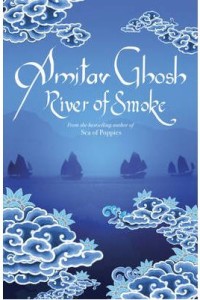 RIVER OF SMOKE
RIVER OF SMOKE
Amitav Ghosh
John Murray, June 2011, RRP $27.95
The second in Amitav Ghosh’s Ibis trilogy, River of Smoke first takes up some 40 or 50 years after the events of Sea of Poppies, to reveal the ultimate fate of several of the characters. Since the end of the last book left things up in the air*, this choice threw me a bit when I started it. Perhaps I have a tendency to become complacent when reading certain things, so am particularly confused when shown an unexpected curve ball. I wondered if, perhaps, this second book took place entirely at this juncture. Fortunately for my state of mind, the novel does quickly return to the 1830s and the continuing development of the first Opium War.
River of Smoke introduces a bevvy of new characters, most of them residents of the various factory “hongs” in the foreign quarters of Guandong. We meet the wealthy Parsi trader Bahram Moddie, and the affected, self-deluded artist Robin. Neel† and Paulette, prominent characters in the previous book, also have their own stories. However, several of my favourite characters from Sea of Poppies, such as the convivial and baffling Baboo Nob Kissin, are only glanced at. Others, such as Zachary, do not appear at all. This is not a flaw in the story, because the continuity is of historical events and themes, rather than the characters themselves. It gives Ghosh an opportunity to build new people and their histories, their struggles in the modernising world.
Nonetheless, as much as the characters themselves were interesting, River of Smoke focuses heavily on areas such as business and botany. It’s entirely a matter of personal taste that I am less compelled by these stories than those in the previous book. I’m just not all that fascinated by matters such as mysterious orchids and matters of trade. This novel is also less funny than its predecessor. I believe attempts at humour are drawn in the relationships of businessmen, who display the odd effeminate tendency, but I’m not certain. I would like to hope Ghosh is not poking fun at effeminate or homosexual tendencies—I did not myself find it amusing—but the tone suggests it was an attempt at humour. There is a lot of dark humour present in the hypocritical reasoning the English businessmen apply against the Chinese. But perhaps that was not meant to be humorous. I found it hard to tell.
Where Ghosh does excel is his marvellous ear for language, and his ability to reproduce the rhythm and pace of so many different languages and accents. Dialogue in Bengali is written without speech markers, perhaps to indicate a fluency for both the author and the characters who use it—that is their native tongue. The various varieties of English are written such that the reader can easily identify English, Indian or American speakers. I can’t, for reasons that should be unsurprising, comment on the accuracy of the trader pidgin used‡, but I’m happy enough to take it for accurate.
River of Smoke is an excellent glimpse into the ways in which English traders attempted to justify their vicious campaign against the Chinese government. They flout regulations banning opium, and criticise the Chinese for attempting to enforce their own law, though similar laws exist in England and America prohibiting the opium trade. This is demonstrated best with the character of Mr Burnham, who even looks like a capitalist cartoon. His reasoning is very much based on the notion of the “white man’s burden”, as well as the glory of the free market, and his hypocrisy is one of the major continuities in the series.
Bahram Moddie on the other hand, himself a dealer in opium, struggles with a desire to sure up his and his family’s future by throwing in his cards with the English opium traders. The reader understands this is a desparate attempt at becoming part of the new, English world, when other Indian businessmen have been ruined or forced to sell out; entire industries destroyed by colonisation. Bahram, as a Parsi, relates this conflict very clearly to that between the light and dark forces of the Zoroastrian faith. Frankly, it is refreshing to see a “deal with the devil”§ narrative that is not related to Christian symbolism.
While I was not so keen on the focus of the story’s events, I enjoyed River of Smoke and came to love the characters therein. I must admit, it will be a difficult parting with them all in the final book of the trilogy. I certainly feel compelled to look up more of Ghosh’s works.
*Literally, if you believe Deeti.
†Number one candidate for the role of author insert.
‡It does read a little bit like a cruelly stereotyped Chinese accent, but since some Chinese characters speak English without it, I don’t think this was intentional.
§Yes, I appreciate the irony of using that phrase in the circumstances.

